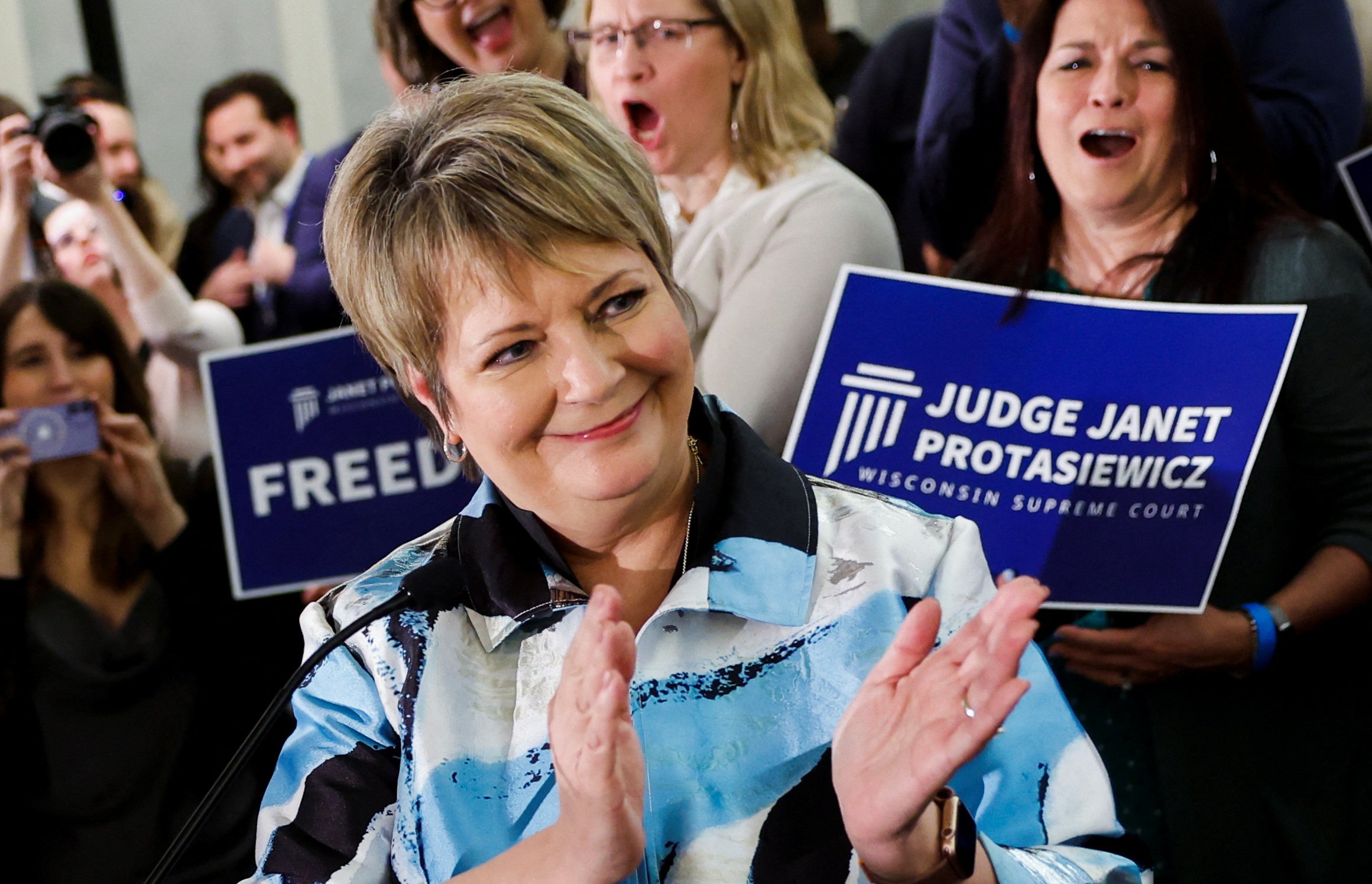
WASHINGTON — In a high stakes Wisconsin election April 4, voters chose a state Supreme Court justice likely to tip the court’s balance and vote in favor of dismantling the state’s abortion restrictions.
Milwaukee County Circuit Judge Janet Protasiewicz, described as a liberal leaning judge, defeated Justice Dan Kelly, a conservative who had previously served on the state’s Supreme Court from 2016-2020, filling a vacated seat. This race was not only watched in Wisconsin but around the country.
The outcome shifts the current court’s 4-3 conservative majority. Protasiewicz will serve a 10-year term starting in August, replacing a retiring conservative justice.
Attention given to this election and the large voter turnout — reported as the highest for a Wisconsin Supreme Court election that wasn’t during a presidential primary — was primarily due to the hot-button issues on the court’s docket: abortion and Republican-drawn legislative maps.
The race was also described as the most expensive election of its kind in U.S. history. More than $42.3 million had been spent on it as of April 3, according to a review by WisPolitics.com.
Much of the campaign focus was on abortion legislation, since the court is expected to rule on a pending lawsuit challenging the state’s 1849 law banning abortion.
The law, which automatically went into effect after the Supreme Court overturned Roe v. Wade last year, does not include exemptions for rape or incest, something a group of state Republicans tried to introduce in March. But that proposal was immediately criticized by both parties and by the Wisconsin Catholic Conference, the public policy arm of the state’s bishops.
Kelly was endorsed by Wisconsin Right to Life and Protasiewicz was backed by Planned Parenthood in Wisconsin.
Prior to the election, state Catholic leaders reminded Catholics to vote with their consciences. One priest took this a step further, urging parishioners in a parish bulletin who to vote against while coming short of mentioning Protasiewicz’s name.
Father Brian Dulli, pastor of St. Patrick’s Church in Cottage Grove, Wisconsin, said in a March 26 parish bulletin that one candidate “has tried to make this race entirely an effort to legalize abortion in the State of Wisconsin.
“You cannot publicly support abortion or abortion advocates and remain a Catholic in good standing,” Father Dulli said in the bulletin. “The fact that this is a Supreme Court race does not exempt us from our duty to protect life. This moment requires our duty. It’s a mortal sin to render aid to the cause of abortion. That aid includes voting.
“As a Catholic, I urge you, for the salvation of your soul; do not vote for her in the Supreme Court race on April 4,” the bulletin note added.
The pastor’s words were reported to the Internal Revenue Service by an attorney with the activist group Freedom from Religion Foundation, based in Madison.
Wisconsin Public Radio, reporting on this complaint, said the attorney asked the IRS to remove the parish’s nonprofit status since churches, which are exempt from paying taxes, cannot endorse or oppose any political candidate for public office.
In a March 28 letter, Milwaukee Archbishop Jerome Listecki told Catholics to “take responsibility for the lack of support for the protection of the innocent when we vote for candidates and laws that liberalize abortion laws.
“There is nothing enlightened about an individual who fails to realize that the denial of the right to life for the most vulnerable among us is an attack on the dignity and personal value of every citizen. I could not and would not support a candidate whose position on life is contrary to the teachings of the Church — a position contrary to the teachings and love of Jesus,” he wrote.
Similarly, Madison Bishop Donald Hying, in a March 30 letter to diocesan Catholics, urged them to consider before voting if they want to “elect civic leaders who stand on the unshakeable moral principle that every human life is sacred and of immeasurable worth, or, do we elect those who disregard the fundamental dignity of life and advocate for taking the life of the most innocent in the womb?”
Prior to the election, Tommy Valentine, the national field director of CatholicVote, a political action group based in Wisconsin, said the state’s Supreme Court race “stands out as the most important election affecting abortion since the U.S. Supreme Court’s June 2022 decision overturning Roe v. Wade.”
He said “whoever wins on April 4 will likely be the fourth vote for either life or abortion. Put simply, Wisconsin voters are essentially voting on abortion. The right to life is on the ballot.”
